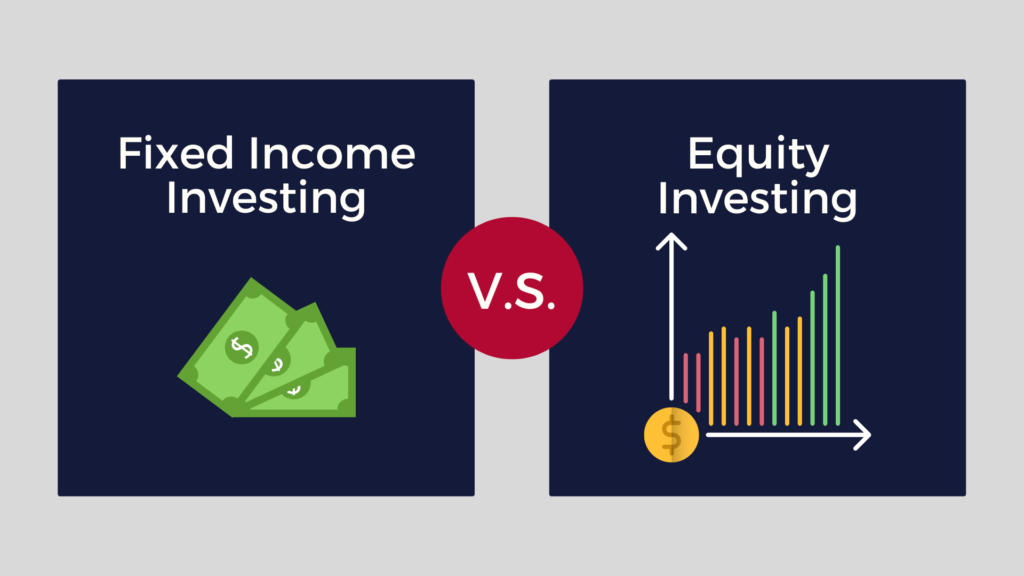Fixed Income Investing vs. Equity Investing

The most common asset classes held in a portfolio are equities (e.g. common stocks), fixed income (e.g. bonds) and to a lesser extent, alternative investments (specialty funds, mortgages etc.). A high-net-worth individual, foundation, corporation, institution or trust may employ the services of several managers, each of whom specializes in one of these three asset classes, to form an overall diversified investment portfolio. This article discusses the main differences between fixed income and equity investing and highlights a major difference between the two during inflationary periods.
Fixed Income Characteristics
With fixed income securities, cash flows (income payments) are paid out in fixed amounts at regular intervals and the principal (loan) is paid back at maturity. The payment rate (coupon) and principal payment date are essentially guaranteed and provide certainty in your returns. This low-risk certainty in returns is attractive to risk-adverse investors.
It is important to note that fixed income securities or bonds offer only a claim to promised payments. They are a loan to the company for which you receive payment. They do not provide any ownership of the issuing company.
A large proportion of fixed income securities are issued by government agencies at all levels, federal through to municipal.
While fixed income securities may be lower risk, they also provide lower returns. They are unlikely to keep pace in an environment of increasing inflation because their payment rate is fixed and therefore does not fluctuate with inflation.
Rarely, there is also the potential for default risk, the risk that the issuer may default and be unable to make coupon payments or pay back principal on maturity. This is a relatively low risk and is negligible for government issued bonds.
Equities Characteristics
Common stocks are the most widely traded equities and give holders the right to a portion of a company’s assets representing partial ownership in the company. They include the right to vote at shareholder meetings and thereby have a say in the management of the company.
Some common stocks pay dividends at regular intervals (similar to coupon payments on bonds). While dividends are not guaranteed, companies tend to announce the payment of dividends only when they are comfortable with their long-term outlook and their ability to generate sufficient cash flows to make ongoing regular dividend payments. Companies can also increase dividends during inflationary periods if they believe their outlook is strong enough to sustain a higher dividend payment.
Equities can be volatile, losing value during a weak economy, but also providing the potential for substantial upside performance during a growing economy or for a specific well performing company. However, assuming the company maintains its dividend, investors will continue to receive income from dividend-paying equities despite volatility in the share price.
Investing with Bloom Investment Counsel, Inc.
Established in 1985, Bloom Investment Counsel, Inc. is a Toronto-based independent, privately-owned boutique investment management firm with experience in managing in excess of $2.5B in assets over the years. We provide actively managed, diversified, customized Canadian and U.S. dividend-paying portfolios for wealthy individuals, family offices, foundations, corporations, institutions and trusts.
In inflationary periods, dividends are often are increased based on inflation-affected earnings. Investing in dividend-paying stocks can therefore help you stay ahead. Over our 25 plus year history of investing in dividend-paying equities we have helped our long-standing clients protect, preserve and build wealth over the long-term.
Are you looking for a personal investment management service that can help you generate income, if needed, and growth? Let’s Talk. Call us at +1-416-861-9941 or email us at info@bloominvestmentcounsel.com
Get access to our exclusive Bloom Investment Overview by subscribing here.
Connect with Bloom Investment Counsel, Inc. on LinkedIn to stay up to date on resources on protecting, preserving and building wealth.
This content is provided for general informational purposes only and does not constitute financial, investment, tax, legal or accounting advice nor does it constitute an offer or solicitation to buy or sell any securities referred to. Individual circumstances and current events are critical to sound investment planning; anyone wishing to act on this content should consult with his or her financial partner or advisor.